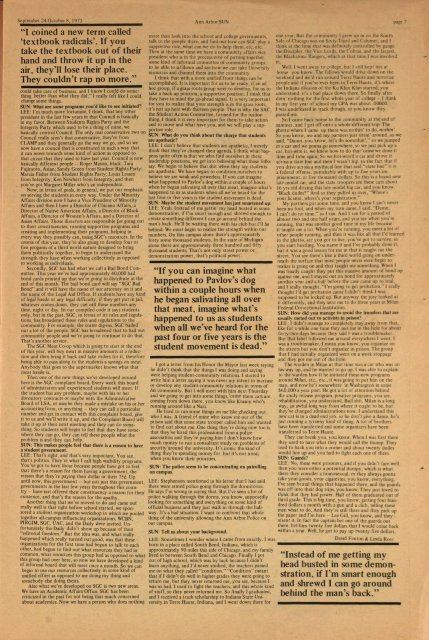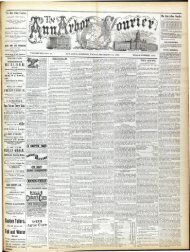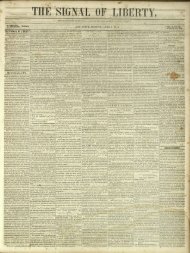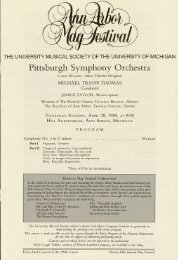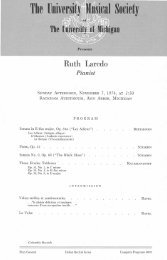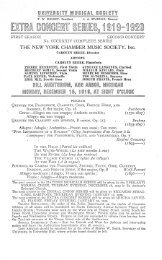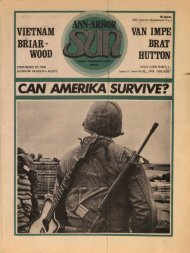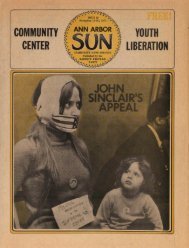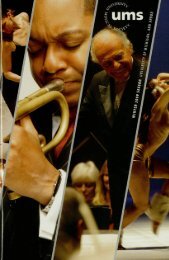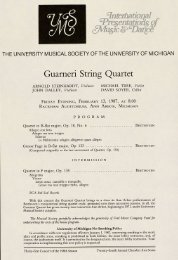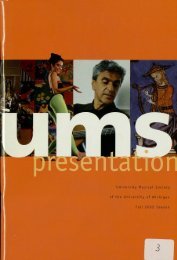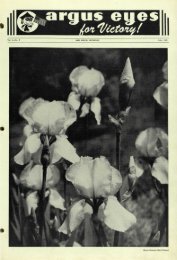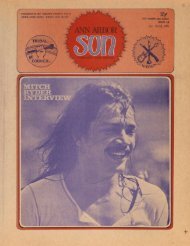SUN SPBCTMDLOSSUS! (&) - Ann Arbor District Library
SUN SPBCTMDLOSSUS! (&) - Ann Arbor District Library
SUN SPBCTMDLOSSUS! (&) - Ann Arbor District Library
You also want an ePaper? Increase the reach of your titles
YUMPU automatically turns print PDFs into web optimized ePapers that Google loves.
September 24-October 8, 1973<br />
"I coined a new term called<br />
'textbook radicals'. If you<br />
take the textbook out of their<br />
hand and throw it up in the<br />
air, they'll lose their place.<br />
They couldn't rap no more."<br />
could take care of business, and I know I could do some<br />
thing better than what they did." I really felt like I could<br />
change some things.<br />
<strong>SUN</strong>: What are some programs you'd like to see initiated?<br />
LEE: I'm much more fortunate, I think, that any other<br />
president in the last few years in that Council is basically<br />
in my favor. Between Students Rights Party and the<br />
Integrity Party which used to be a thing of mine, we<br />
basically control Council. The only real conservative two on<br />
Council really aren't that conservative, they're from<br />
CLAMP and they generally go the way we go, and so we<br />
now have a council that is constituted in such a way that<br />
it can move towards some kind of action as opposed to<br />
that circus that they used to have last year. Council is now<br />
basically different people Roger Mason, black; Tara<br />
Fujimoto, Asian; Sandy Green from Student Rights Party;<br />
Marcia Fisher from Student Rights Party; Louis Lessen<br />
from Integrity; Ken Newbert from Integrity; and then<br />
you've got Margaret Miller who's an independent.<br />
Now, in terms of goals, in general, we put our emphasis<br />
on serving the students in every way. Under the Minority<br />
Affairs division now I have a Vice President of Minority<br />
Affairs and then I have a Director of Chicano Affairs, a<br />
Director of Native American Affairs, a Director of Black<br />
Affairs, a Director of Women's Affairs, and a Director of<br />
Asian Affairs. Those directors are responsible for going out<br />
to their constituencies, running supportive programs and<br />
creating and implementing their programs, helping in<br />
every way they possibly can, using SGC's resources. In the<br />
course of this year, they're also going to develop four or<br />
five progams of a third world nature designed to bring<br />
them politically together, to begin to understand the<br />
strength they have when working collectively as opposed<br />
to working as individuals.<br />
Secondly, SGC has had what we call a Bail Bond Com<br />
mittee. This year we've had approximately 40,000 bail<br />
bond cards printed up that we're going to distribute at the<br />
end of this month. The bail bond card will say "SGC Bail<br />
Bond" and it will have the name of our attorney on it and<br />
the name of the Legal Aid Office. If students have any kind<br />
of legal hassle or any legal difficulty, if they get put in jail,<br />
whatever comes down, they can call these numbers any<br />
time, night or day. In our compiled code it says students<br />
only, but in the past, SGC, in terms of its rules and regula<br />
tions, has broadened those rules and regulations to the<br />
community. For example, the crater dig-ins, SGC bailed<br />
out a lot of the people. SGC has broadened that to bail out<br />
community people and we're going to continue to do that.<br />
That's another service.<br />
The SGC Meat Co-op which is going to start at the end<br />
of this year, will buy meat in massive amounts at a reduc<br />
tion and then bring it back and take orders for it, therefore<br />
being abje to pass along to the students a savings on meat.<br />
Anybody that goes to the supermarket knows what that<br />
meat hassle is.<br />
Then one of the new things we've developed around<br />
here is the SGC complaint board. Every week this board<br />
of administrators and experienced students will meet. If<br />
the student has any problem, maybe with his or her<br />
dormitory contracts or maybe with the Administrative<br />
Board of LSA, or maybe they made a mistake on his or her<br />
accounting form, or anything - they can call a particular<br />
number and get in contact with this complaint board, give<br />
it to us and we'll write it up, and the Complaint Board will<br />
take it up at their next meeting and they can do some<br />
thing. So students will begin to feel that they have some<br />
where they can go, they can tell these people what the<br />
problem is and they can help.<br />
<strong>SUN</strong>: This makes people feel that there is a reason to have<br />
a student government.<br />
LEE: That's right, and that's very important. You see,<br />
that's politics. They're what I call high visibility programs.<br />
You've got to have those because people have got to feel<br />
that there's a reason for them having a government, the<br />
reason that they're paying their dollar or their 75^. Up<br />
until now, this government - but not just this government,<br />
governments in the last few years throughout this coun<br />
try - have not offered their constituency a reason for their<br />
existence, and that's the reason for the apathy.<br />
Another thing that we've moved to do and came out<br />
really well is that right before school started, we spon<br />
sored a student organization workshop in which we pooled<br />
together all-campus influencing organizations WCBN<br />
PIRGIM, SGC, UAC, and the Daily were invited. Un<br />
fortunately the Daily didn't show up because of their<br />
"editorial freedom." But the idea was, and what really<br />
happened which really turned out good, was that these<br />
organizations for the first time had begun to talk to each<br />
other, had begun to find out what resources they had in<br />
common, what resources this group had as opposed to what<br />
this group had over here, so now we have developed a kind<br />
of informal board that will meet once a month. So we can<br />
begin to use our resources collectively in some kind of<br />
unified effort as opposed to me doing my thing and<br />
somebody else doing theirs.<br />
Also what we've developed on SGC is two new areas.<br />
We have an Academic Affairs Office. SGC has been<br />
criticized in the past for not being that much concerned<br />
about academics. Now we have a person who does nothing<br />
<strong>Ann</strong> <strong>Arbor</strong> <strong>SUN</strong><br />
more than look into the school and college governments,<br />
talk to the people there, and find out how can SGC play a<br />
supportive role, what can we do to help them. etc. etc.<br />
Then at the same time we have a community affairs vice<br />
president who is in the process now of putting together<br />
some kind of informal committee of community groups<br />
to be able to sit down and see how we can take University<br />
resources and channel them into the community.<br />
I think that with a more unified front things can be<br />
accomplished. It is important for us to be ready, if an ad<br />
hoc group, if a grass roots group were.to develop, for us to<br />
take a back-up position, a supportive position. I think that<br />
they have in mind the go-ahead signal. It is very important<br />
for you to realize that your strength is in the grass roots,<br />
it's not up here with thirteen people. That is why the SAC,<br />
the Student Action Committee, formed for the tuition<br />
thing, I think it is very important for them to take action<br />
and to move and what have you, and we will play a sup<br />
portive role.<br />
<strong>SUN</strong>: What do you think about the charge that students<br />
are apathetic?<br />
LEE: I don't believe that students are apathetic, I merely<br />
think that they've changed their agenda. I think what hap<br />
pens quite often is that we who find ourselves in these<br />
leadership positions, we get into believing what these folks<br />
say. We begin to believe that shit when they say students<br />
are apathetic. We have begun to condition.ourselves to<br />
believe we are weak and powerless. If you can imagine<br />
what happened to Pavlov's dog within a couple of hours<br />
when he began salivating all over that meat, imagine what's<br />
happened to us as students when all we've heard for the<br />
last four or five years is the student movement is dead.<br />
<strong>SUN</strong>: Maybe the student movement has just smartened up.<br />
LEE: Yeah. Instead of me gettin' my head busted in some<br />
demonstration, if I'm smart enough and shrewd enough to<br />
create something different I can go around behind the<br />
man's back. He'll be waiting there with his club but I'll be<br />
behind. We must begin to realize the strength within our<br />
numbers. On this campus alone there's approximately<br />
forty some thousand students. In the state of Michigan<br />
alone there are approximately three hundred and fifty<br />
thousand students. That's not only street power or<br />
demonstration power, that's political power.<br />
"If you can imagine what<br />
happened to Pavlov's dog<br />
within a couple hours when<br />
he began salivating all over<br />
that meat, imagine what's<br />
happened to us as students<br />
when all we've heard for the<br />
past four or five years is the<br />
student movement is dead."<br />
1 got a letter from his Honor the Mayor last week saying<br />
he didn't think that the things I was doing and saying<br />
were helping student-community relations. I started to<br />
write him a letter saying it was never my intent to increase<br />
or develop any student-community relations in terms of<br />
his community. But I will meet with him next Thursday<br />
and we going to get into some things.'cause them cats are<br />
coming from down there, you know like Krasny who's<br />
running around like a Nazi.<br />
He tried to run some things on me like checking out<br />
who I was. A friend of mine who knew me out of the<br />
prison said that some state trooper called him and wanted<br />
to find out about me. .One thing they're doing now too is<br />
that they've hired this professional from a police<br />
association and they're paying him I don't know how<br />
much money to run a consultant study on problems of<br />
security around the university. It's ironic the kind of<br />
thing they're spending money for, but it's not ironic<br />
when you know their priorities.<br />
<strong>SUN</strong>: The police seem to be concentrating on patrolling<br />
on campus.<br />
LEE: Stephenson mentioned in his letter that I had said<br />
there were armed police going through the dormitories.<br />
He says I'm wrong in saying that. But I've seen a lot of<br />
police walking through the dorms, you know, supposedly<br />
looking for something and everything on some kind of<br />
official business and they just walk in through the hall<br />
way. It's a bad situation. I want to confront that whole<br />
thing of the university allowing the <strong>Ann</strong> <strong>Arbor</strong> Police on<br />
our campus.<br />
<strong>SUN</strong>: Tell us about your background.<br />
LEE: Sometimes I wonder where I came from exactly. I was<br />
born in a place called South Bend, Indiana, which is<br />
approximately 90 miles this side of Chicago, and my family<br />
lived in between South Bend and Chicago. Finally I got<br />
out of high school, which was by luck because I didn't<br />
learn anything, and I'd never studied, the teachers passed<br />
me on what they called "condition." "Condition" meant<br />
that if I didn't do well in higher grades they were going to<br />
return me, but they never returned me, you see, because I<br />
was so bad. I used to fight the teachers, and this whole kind<br />
of stuff, so they never returned me. So finally I graduated,<br />
and I received a track scholarship to Indiana State Uni<br />
versity in Terre Haute, Indiana, and I went down there for<br />
page 7<br />
one year. But the community I grew up in on the South<br />
Side ot Chicago was on Sixty Third and Calumet, and I<br />
think at the time that was definitely controlled by gangs:<br />
the Disciples, the Vice Lords, the Cobras, and the largest,<br />
the Blackstone Rangers, which at that lime I was involved<br />
in. Well, I went away to college, but I still kept ties at<br />
home you know. The fellows would drive down on the<br />
weekend and we'd run around Terre Haute and terrorize<br />
people and if you've ever been in Terre Haute, it's where<br />
the Indiana division of the Ku Klux Klan started, you<br />
understand, it's a bad place down there. So finally after<br />
doin' nothing for the first whole year of college - I think<br />
in my first year of school my GPA was about .00000.<br />
I was undefeated in track though, so you know they<br />
passed me.<br />
So I came back home to the community at the end of<br />
summer, and I got off onto a whole different trip. The<br />
ghetto where I came up there was nothin' to do.nothin'.<br />
So you know, me and my partners just sittin' around, so we<br />
said, "Damn, you know, let's do somethin'." so we jumped<br />
in a car and we gonna go somewhere, so we just pick up a<br />
car, hot-wire it, we knew how to do that 'cause we done it<br />
time and time again. So we hot-wired a car and drove it<br />
across a state line and then I wasn't hip to the fact that if<br />
you drive across a mythical line that said "state line" it is<br />
a federal offense. punishable with up to five years im<br />
prisonment, or five thousand dollars. So this is a brand new<br />
late model car, and the state troopers see these cats about<br />
16 yrs old driving this late model big car, and you know.<br />
"Black dudes?" And so they pulled us over, "Where's<br />
your license, where's your registration."<br />
My partners got some time, and you know I ain't never<br />
been no fool, and when my turn came. I said. "Damn,<br />
I can't do no time," so I ran. And I ran for a period of<br />
almost two and one half years, and you see when you're<br />
running, that was another good time in my life because<br />
it taught me a lot. When you're running, you meet a lot of<br />
other people running, and then it was like all that I'd learned<br />
in the ghetto, see you got to live, you've got to survive, so<br />
you start hustling. You name it and I've probably done it,<br />
but it was a good lesson for me in that it taught me the<br />
street. You see there's like a third world going on under<br />
neath the surface that most people never even begin to<br />
realize is going on and that taught me something. When I<br />
was finally caught they put this massive amount of bond up<br />
against me, and I stayed out on bond for approximately<br />
another year and a half before the case came up to trial,<br />
and I really thought. "I'm going to get probation." I really<br />
thought I'd get probation cause I didn't think I was<br />
supposed to be locked up. But anyway the jury looked at<br />
it differently, and they sent me to do three years at Milan<br />
Federal Correctional Institution.<br />
<strong>SUN</strong>: How did you manage to avoid the transfers that are<br />
usually meted out to activists in prison?<br />
LEE: I didn't manage to completely stay away from that,<br />
like for a while one time they put me in the hole for about<br />
forty-two days because they said I was a troublemaker.<br />
But that label followed me around everywhere I went. I<br />
was a troublemaker, I mean you know, you organize on<br />
the streets but you don't organize in prison. The group<br />
that I had initially organized went on a work stoppage<br />
and they got me out of the hole.<br />
The warden in Milan at that time was a cat who was on<br />
his way up, and he wanted to go up. I was able to explain<br />
to the warden how if he initiated these new programs<br />
around Milan, etc., etc.. it was going to put him on the<br />
map, and now he's somewhere in Washington in some<br />
$60,000 a year post. He got a lot of attention behind<br />
the study release program, positive programs, you see,<br />
rehabilitation, you understand. Bull shit. Milan is a long<br />
way, an awful long way from where it ought to be, but<br />
they've changed administrations now. I understand this<br />
new cat is in a dead end job, so he don't give a damn, he's<br />
just running a tyranny kind of thing. A lot of brothers<br />
have been transferred and some organizers have been<br />
transferred to Terre Haute.<br />
They can break you, you know. When I was first there<br />
they used to have what they would call the thump. They<br />
used to back you into a corner and about twenty dudes<br />
would line up and you had to fight each one of them.<br />
<strong>SUN</strong>: Guards?<br />
LEE: No. these were prisoners, and if you didn't fare well,<br />
then you were either a potential dumpy, which is what<br />
there they consider a homosexual, or they always gonna<br />
take your goods, your cigarettes, you know, everything.<br />
I've seen brutal things that happened there, and the guards<br />
was off into their dog trips, you know. They just loved to<br />
think that they had power. Half of them graduated out of<br />
third grade. This is big time, you know, getting four hun<br />
dred dollars a month with a gun and a club, telling these<br />
men what to do. And they're still there and they pick up<br />
the paper and I'm here - Lee Gill, you know, and they<br />
resent it. In fact the captain bet one of the guards out<br />
there, bet him twenty five dollars that I would come back<br />
within a year. Well, he got to pay up twenty five dollars.<br />
David Fenton & Linda Ross<br />
"Instead of me getting my<br />
head busted in some demon<br />
stration, if I'm smart enough<br />
and shrewd I can go around<br />
behind the man's back."


